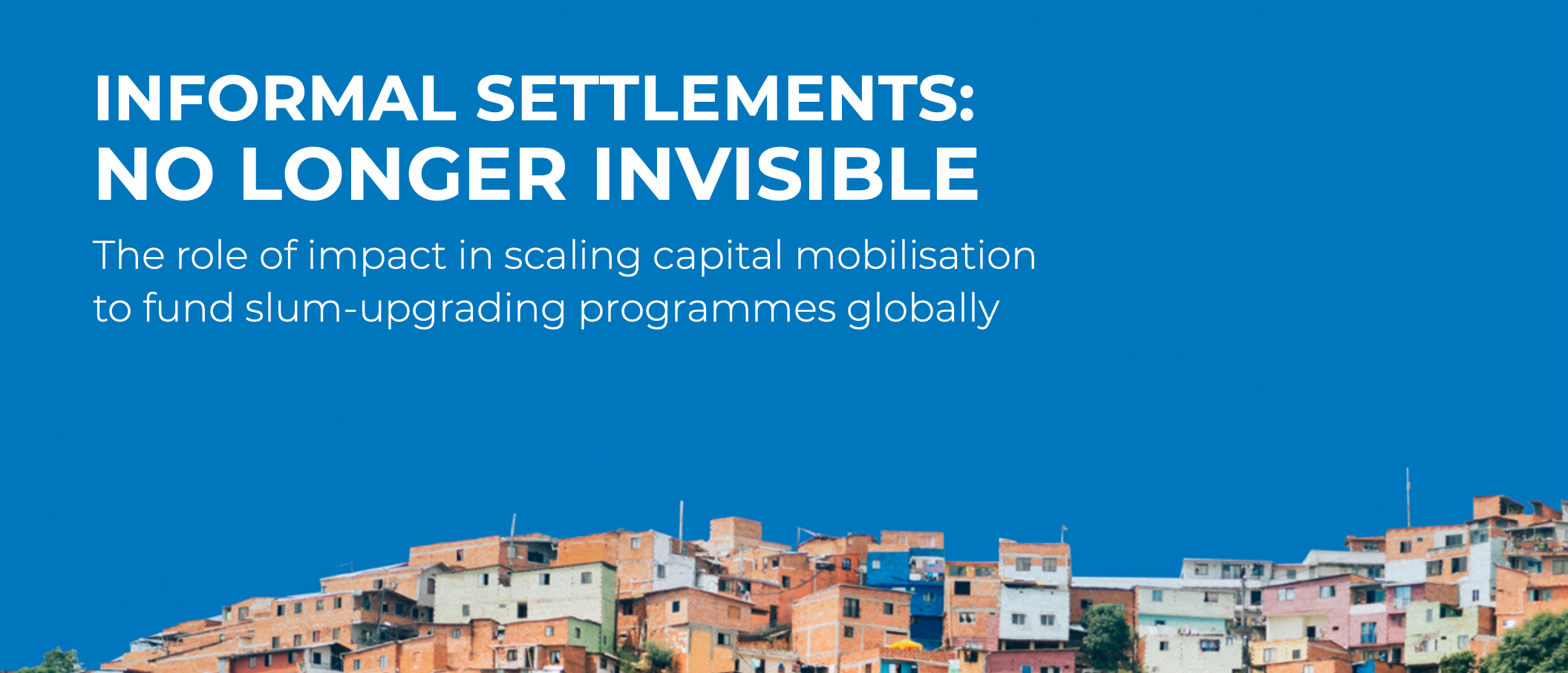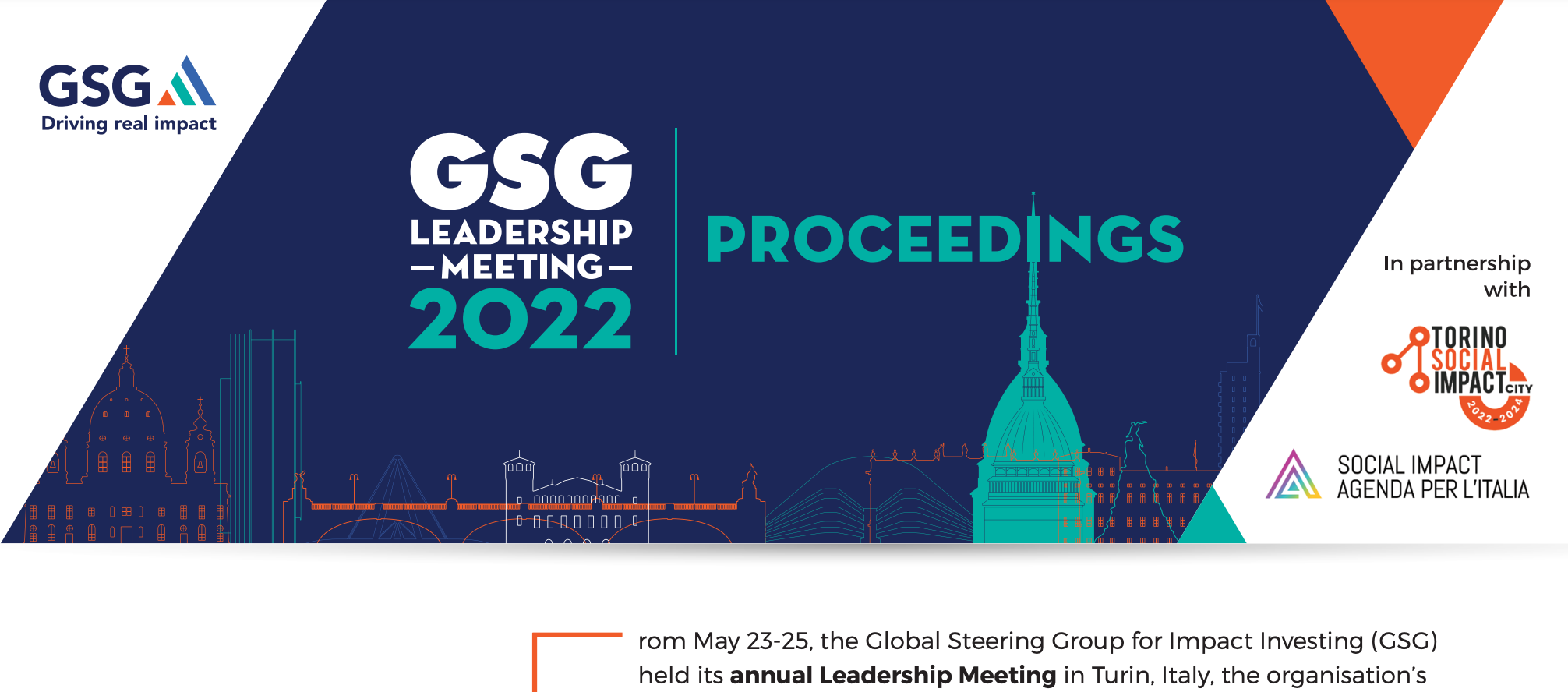
Upgrading living conditions for 1 billion people in the Global South critical to meeting the SDGs
LONDON – Impact-led Investment of $6 trillion is needed to lift over 1 billion people out of slum conditions across the Global South. Doing so will represent an essential step towards the world achieving the SDGs by 2030, according to the GSG’s latest report entitled “Informal Settlements: No Longer Invisible”.
Despite the urgent need for investment, public funds alone are woefully insufficient to address the requirements for upgrading slums. Furthermore, informal settlement investments have been largely overlooked by investors, who have been focused on other pressing themes such as education, access to healthcare or agriculture.
The GSG’s Informal Settlements report makes the case for prioritising urban slums as a core area for impact investment and development. It outlines how improving the places in which people live can have multiple benefits for public health, education and economic opportunities, making addressing informal settlements central to achieving the SDGs. The report also identifies private capital structures, as well as the cooperation between investors, government bodies and other stakeholder groups, needed to draw in impact investment.
Around the world, one in eight people live in informal urban settlements without proper access to drinking water, sanitation or electricity. The issue is widespread and acute with 55% of the urban population of Zambia living in slum areas, along with some 48% of the urban population in Bangladesh, and 28% in Colombia.
In addition to poor housing without basic utilities, the precarious and often illegal nature of slum developments means that many inhabitants cannot access education, healthcare, the labour market or financial services. Death rates among infants and children are higher than for other urban groups, there is greater risk of respiratory infection, and inhabitants are more affected by the effects of climate change, such as flooding in low-lying areas.
“The impacts of slum-upgrading programmes and projects reach far beyond providing much needed basic infrastructure; they improve living conditions, public health and educational outcomes, and stimulate local economies by boosting quality job creation,” said Sir Ronald Cohen, the GSG’s Chair.
“By shining a light on informal settlements, our aim is to spur the creation of financial vehicles and solutions that both help to address many of the complex issues slum-dwellers face, while offering purpose-driven investors the opportunity to deliver impact at scale and meet their financial return objectives,” Cohen added.
The GSG highlights the potential to adapt existing financing instruments, including Green, Social, Sustainability and Sustainable-Linked Bonds to channel private capital investment into informal settlements. Over $1 trillion was raised across such instruments in 2021, which Moody’s ESG Solutions forecasts will increase to $1.35 trillion in 2022.
The report also draws attention to the often-sizeable informal economies in slums. A 2020 study by the Data Favela Institute and Locomotiva Institute found that residents of Brazilian favelas had a combined purchasing power of almost $28 billion, more than the annual GDP of Cambodia or El Salvador. If this economic strength is recognised – and potentially guaranteed by governments – it could be mobilised to help pay returns, creating a win-win-win for communities, investors and society at large.
The GSG makes a number of recommendations for investors, governments and other stakeholders to prioritise and drive investment into informal settlement upgrades. These include:
- For investors to look beyond thematic approaches in areas like healthcare and education at place-based solutions and multi-dimensional strategies
- For governments to make tackling informal settlements a priority and find solutions to de-risk investments for investors
- For urban planners and habitat experts to acknowledge and understand the role that private investment can have in upgrading urban areas
- All stakeholders to recognise the need to place communities at the heart of projects, involving resident and giving them a sense of ownership.
In short, the report calls on all parties to no longer view slums and their inhabitants as a problem, but to acknowledge the potential in transforming urban liabilities into assets. The GSG aims to stimulate an action-oriented conversation that will lead to the creation of scalable solutions that will address a global challenge affecting over a billion people, and ultimately help deliver the SDGs.
Please click here to download the Informal Settlements: No Longer Visible report.
ENDS//
Notes to editors
For media enquiries, please contact:
Lynn Nicholson, Chief Communications Officer, The Global Steering Group for Impact Investment – lynn.nicholson@gsgii.org
Mobile: +32 494 813 837
About the Global Steering Group for Impact Investment (GSG)
The Global Steering Group for Impact Investment (GSG) is an independent global steering group promoting sustainable development and advancing education in impact investment. The GSG was established in 2015 as the successor to, and incorporating the work of, the Social Impact Investment Taskforce established under the UK’s presidency of the G8. The GSG’s National Advisory Boards (NABs) currently cover 35 countries. The GSG brings together leaders from finance, business, philanthropy and governments to drive a shift towards impact economies. For more information visit www.gsgii.org and follow the GSG on and follow the GSG on and follow the GSG on Twitter and LinkedIn.

The role of impact in scaling capital mobilisation to fund slum-upgrading programmes globally.

From May 23-25, the Global Steering Group for Impact Investing (GSG) held its annual Leadership Meeting in Turin, Italy, the organisation’s first in-person meeting since the start of COVID-19. The meeting included more than 140 leaders from over 51 countries who came together to reflect on progress with regard to ecosystem building, co-create solutions to current challenges and priority areas, and identify ways to achieve our vision.

